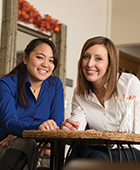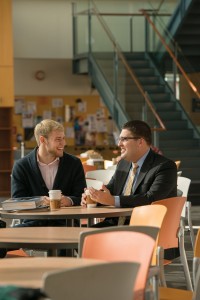Through invaluable relationships, mentors give back to the next generation
 According to information gathered by the White House for National Mentoring Month in January, 77 percent of businesses with formal mentoring programs have increased employee retention rates. Personnel who participate say the relationships that are formed motivate them to do their best. Mentorship, however, expands beyond the workplace. It’s a mutually beneficial relationship for the mentors who give their time and for the mentees who receive the generosity.
According to information gathered by the White House for National Mentoring Month in January, 77 percent of businesses with formal mentoring programs have increased employee retention rates. Personnel who participate say the relationships that are formed motivate them to do their best. Mentorship, however, expands beyond the workplace. It’s a mutually beneficial relationship for the mentors who give their time and for the mentees who receive the generosity.
“Be a mentor, have a mentor,” Jim Krimmel, Messiah College’s professor of accounting, said. “At any stage of life there should always be someone we can look to for advice and always someone we can mentor.”
Being invested
Krimmel, along with accounting alumna Sara Bruton ’09, worked to establish an alumni/student mentoring program at Messiah to guide students from college to the professional world while also connecting them with alumni. In the program, sophomore, junior and senior accounting students collaborate with recent alumni who offer everything from learning study skills to tips for taking the certified public accountant exam.
“I enjoy seeing people get better,” said Bruton. “I am blessed to be part of the Messiah accounting program and saw this as a way to make it even better.”
Though participation in the program is not required, Krimmel says many students want to be involved. “We’ve really tried to not make this about recruiting. It’s not meant as a way to get a job,” said Krimmel. “It might help tap into their network, but the purpose is not job hunting or internships. It’s more personal.”
Accounting major Nic Trout ’14 knows the value of building a relationship with an alum in his field. Kimmel paired Trout with Mitch Martin ’12, an accountant at Hamilton & Musser, a firm in Mechanicsburg, Pa. “Mitch takes time out of his busy schedule to meet me on campus for lunch or coffee,” said Trout. “It allows us to talk not only about accounting, but also about relationships, passions and the impact of Christ on our lives.”
Christy Hanson ’03, director of the Career Center, notes that mentoring takes time and energy. “Mentoring, like networking, can and often does happen spontaneously. What sets mentoring apart is the level of investment it brings,” said Hanson. “Beyond securing a job, a mentor can help you think about reflecting on vocation, the purpose and meaning associated with your potential work and how your faith works into that.”
Seeking knowledge
“A good mentor can balance challenging and supporting his or her mentee,” said Hanson. “A mentor should not necessarily give answers, but instead ask good, challenging questions.”
Exploring those challenging questions often leads to camaraderie among peers. The Amigo Mentoring Program pairs incoming domestic multicultural students with upperclassmen to help with the transition to college. Though the program focuses strongly on racial reconciliation, mentors and mentees also meet to discuss topics such academics, opportunities to get involved on campus, career preparation and faith development. Aime Bantz ’15, an education major and an Amigo mentor, shares her own college experience with first-year students, helping them adjust to life on the Messiah College campus.
In turn, she helps herself become a leader, better preparing for her career. “As an education major, this opportunity to interact with people younger than I and to be a role model is preparing me for my future career as an educator,” said Bantz. “I’m able to effectively deliver information to these students, which I’ll need to do in the classroom on a daily basis.”
Aiming for transformation
A natural outcome of personal development is growth. Beyond gaining a new relationship and expertise, a mentor and mentee can take time in their mentoring relationship to reflect on themselves, their career and their lives holistically. Citing 2 Timothy 2:2, George Pickens, a professor of theology and mission at Messiah, says one of the most important goals of a mentoring partnership is to help a mentee learn enough to transform into a mentor.
Pickens helps supervise the mentoring portion of the Fitness for Ministry program that is required of all Christian ministry majors in their sophomore and senior years. In addition to learning portfolio preparation, self-assessment and deepening spiritual health, students team up with older, more experienced members in the church and mission field.
“A good Christian mentor provides a holistic perspective, one that includes not only vocational and life skills, but also faith and spiritual formation,” said Pickens. “A good Christian mentor has mastered a degree of this integration and holism in his or her own life, so that one’s entire being and doing is formed by the presence of God and is for God. This, then, is offered as a living example to the one being mentored.”
Who’s your mentor?
Though the definition of a mentor is open to interpretation, successful mentors and mentees make a mutual investment of time, commitment and talent to form personal relationships that help both partners grow, learn and bond over a shared desire to better themselves and the communities around them.
One entrepreneurship alum reflects on a mentoring relationship that began when he was a first-year student with Terry Earhart, a now-retired assistant professor of management. “Professor Earhart has played a pivotal role in my development as a leader, Christ follower and individual,” said Jacob Specht ’11, who moved to Chicago after graduation to launch a software start-up company. “When I face big decisions and need wise counsel, I still seek Terry’s wisdom and guidance.”
Specht’s testimony shows the value that a mentor can provide — professionally, personally or otherwise — is immeasurable.
This story by Erin Bray ’10 first appeared in the fall 2013 issue of The Bridge.




